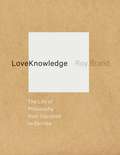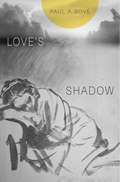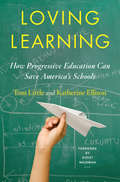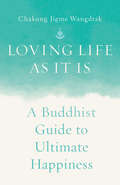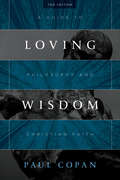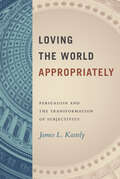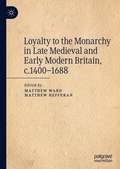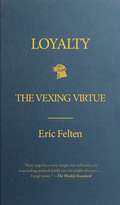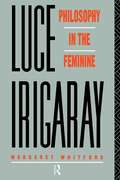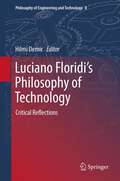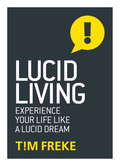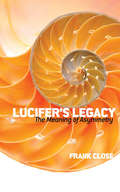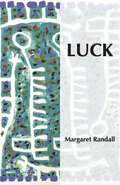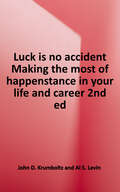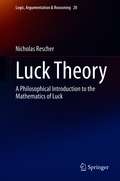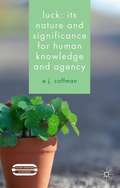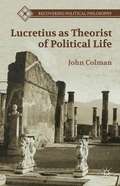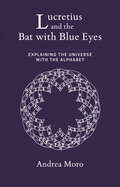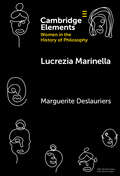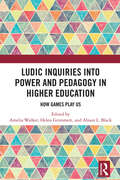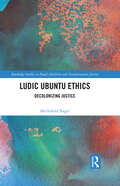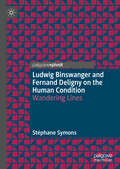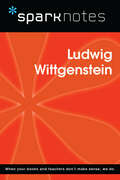- Table View
- List View
LoveKnowledge: The Life of Philosophy from Socrates to Derrida
by Professor Roy BrandSince its inception, philosophy has struggled to perfect individual understanding through discussion and dialogue based in personal, poetic, or dramatic investigation. The positions of such philosophers as Socrates, Spinoza, Rousseau, Nietzsche, Foucault, and Derrida differ in almost every respect, yet these thinkers all share a common method of practicing philosophy—not as a detached, intellectual discipline, but as a worldly art. What is the love that turns into knowledge and how is the knowledge we seek already a form of love? Reading key texts from Socrates to Derrida, this book addresses the fundamental tension between love and knowledge that informs the history of Western philosophy. LoveKnowledge returns to the long tradition of philosophy as an exercise not only of the mind but also of the soul, asking whether philosophy can shape and inform our lives and communities.
Love’s Shadow
by Paul A. BovéA case for literary critics and other humanists to stop wallowing in their aestheticized helplessness and instead turn to poetry, comedy, and love.Literary criticism is an agent of despair, and its poster child is Walter Benjamin. Critics have spent decades stewing in his melancholy. What if instead we dared to love poetry? To choose comedy over Hamlet’s tragedy, romance over Benjamin’s suicide on the edge of France, of Europe, of civilization?Paul Bové challenges young lit critters to throw away their shades and let the sun shine in. Love’s Shadow is his three-step manifesto for a new literary criticism that risks sentimentality and melodrama and eschews self-consciousness. The first step is to choose poetry. There has been since the time of Plato a battle between philosophy and poetry. Philosophy has championed misogyny, while poetry has championed women, like Shakespeare’s Rosalind. Philosophy is ever so stringent; try instead the sober cheerfulness of Wallace Stevens. Bové’s second step is to choose the essay. He praises Benjamin’s great friend and sometime antagonist Theodor Adorno, who gloried in the writing of essays, not dissertations and treatises. The third step is to choose love. If you want a Baroque hero, make it Rembrandt, who brought lovers to life in his paintings.Putting aside passivity and cynicism would amount to a revolution in literary studies. Bové seeks nothing less, and he has a program for achieving it.
Loving Animals: Toward a New Animal Advocacy
by Kathy RudyThe contemporary animal rights movement encompasses a wide range of sometimes-competing agendas from vegetarianism to animal liberation. For people for whom pets are family members—animal lovers outside the fray—extremist positions in which all human–animal interaction is suspect often discourage involvement in the movement to end cruelty to other beings. In Loving Animals, Kathy Rudy argues that in order to achieve such goals as ending animal testing and factory farming, activists need to be better attuned to the profound emotional, even spiritual, attachment that many people have with the animals in their lives.Offering an alternative to both the acceptance of animal exploitation and radical animal liberation, Rudy shows that a deeper understanding of the nature of our feelings for and about animals can redefine the human–animal relationship in a positive way. Through extended interviews with people whose lives are intertwined with animals, analysis of the cultural representation of animals, and engaging personal accounts, she explores five realms in which humans use animals: as pets, for food, in entertainment, in scientific research, and for clothing. In each case she presents new methods of animal advocacy to reach a more balanced and sustainable relationship association built on reciprocity and connection.Using this intense emotional bond as her foundation, Rudy suggests that the nearly universal stories we tell of living with and loving animals will both broaden the support for animal advocacy and inspire the societal changes that will improve the lives of animals—and humans—everywhere.
Loving Learning: How Progressive Education Can Save America's Schools
by Ayelet Waldman Katherine Ellison Tom LittleNoted educator Tom Little and Pulitzer Prize-winning journalist Katherine Ellison reveal the home-grown solution to turning American students into life-long learners. The longtime head of Park Day School, Tom Little embarked on a tour of 43 progressive schools across the country. In this book, his life's work, he interweaves his teaching experience, the knowledge he gleaned from his trip, and the history of Progressive Education. As Little and Katherine Ellison reveal, these educators and schools invigorate learning and promote inquisitiveness by allowing the curriculum to grow organically out of children's questions--whether they lead to studying the senses, working on a farm, or re-creating a desert ecosystem in the classroom. We see curious students draw on information across disciplines to think in imaginative yet practical ways, like in a "Mini-Maker Faire" or designing and building a chair from scratch. Becoming good citizens was another of Little's goals. He believed in the need for students to learn how to become advocates for themselves, from setting rules on the playground to engaging in issues of social justice in the wider community. Using the philosophy of Progressive Education, schools can prepare students to shape a vibrant future in the arts and sciences for themselves and the nation.
Loving Life as It Is: A Buddhist Guide to Ultimate Happiness
by Chakung Jigme WangdrakPractical Buddhist wisdom and mindful methods for finding the silver lining in all circumstances—from a remarkable new voice in the Tibetan Buddhist tradition.Chakung Jigme Wangdrak gives concrete advice on how to reorient your thinking when faced with the challenges, mess, and chaos that inevitably occur in life. By embracing pain and suffering, you can learn to see their roots, begin to work with them, and eventually let them go. This will create joy and ease, allowing you to fully savor happiness.In clear language, Jigme Wangdrak conveys the steps, stages, and categories of mental exercises and methods that everyone—from beginner to experienced practitioner and non-Buddhists—can use to train their mind toward happiness:Take happiness and suffering as the pathCultivate courage, gratitude, and compassionPractice contentment (not complacency)Recognize outer and inner obstacles when faced with challenging situationsDispel self-grasping to reduce suffering Develop patience and toleranceA true Buddhist master and unique lineage holder, Jigme Wangdrak offers a roadmap to freedom with teachings that will benefit your spiritual practice and daily life—he shows you how to love your life as it already is!
Loving Wisdom: A Guide to Philosophy and Christian Faith
by Paul CopanA guide to Christian philosophy that engages with the biblical storyAs human beings, we all qualify as philosophers, and Paul Copan contends that we take a position of trust (faith) shaped by philosophical stances but also personal heart commitments (worldviews). In this thoroughly revised and expanded second edition of Loving Wisdom, Copan explores philosophy of religion from a distinctively evangelical Christian perspective—biblically grounded, informed by apologetics, and engaging with questions about universal human longings. Copan presents a distinctively and deliberately biblical philosophy of religion in Loving Wisdom,addressing a wide range of topics and questions as they arise in the metanarrative of scripture. He acknowledges the difficulties, mystery, and disagreements in &“religion,&” while attempting to show how the Christian faith does a much more adequate job of responding to a wide range of challenges as well as addressing our deepest human yearnings. With discussion questions for each chapter and an accessible approach, Loving Wisdom is ideal for the classroom or small groups.
Loving the World Appropriately: Persuasion and the Transformation of Subjectivity
by James L. KastleyA revolutionary approach to rhetoric that asks why audiences need persuading. What is persuasion? For some, it is the ideal alternative to violence. For others, persuasion is simply a neutral instrumentality—a valued source of soft power. Both positions rest on a fundamental belief: persuasion is a power that resides in a speaker acting on an audience. Loving the World Appropriately asks a different, more fundamental, question: why does an audience need persuasion? In shifting our focus, James Kastely delivers a provocative new history of rhetoric and philosophy, one that describes rhetoric as more than a matter of effective communication and recasts persuasion as a philosophical concern central to notions of human subjectivity. Ultimately, Kastely insists, persuasion enables us to love the world appropriately.
Loyalty to the Monarchy in Late Medieval and Early Modern Britain, c.1400-1688
by Matthew Ward Matthew HefferanThis book explores the place of loyalty in the relationship between the monarchy and their subjects in late medieval and early modern Britain. It focuses on a period in which political and religious upheaval tested the bonds of loyalty between ruler and ruled. The era also witnessed changes in how loyalty was developed and expressed. The first section focuses on royal propaganda and expressions of loyalty from the gentry and nobility under the Yorkist and early Tudor monarchs, as well as the fifteenth-century Scottish monarchy. The chapters illustrate late-medieval conceptions of loyalty, exploring how they manifested themselves and how they persisted and developed into early modernity. Loyalty to the later Tudors and early Stuarts is scrutinised in the second section, gauging the growing level of dissent in the build-up to the British Civil Wars of the seventeenth century. The final section dissects the role that the concept of loyalty played during and after the Civil Wars, looking at how divergent groups navigated this turbulent period and examining the ways in which loyalty could be used as a means of surviving the upheaval.
Loyalty: The Vexing Virtue
by Eric FeltenA witty, provocative, story-filled inquiry into the indispensable virtue of loyalty--a tricky ideal that gets tangled and compromised when loyalties collide (as they inevitably do), but a virtue the author, a prizewinning columnist for The Wall Street Journal, says is as essential as it is impossible. Felten illustrates the push and pull of loyalties-- from the ancient Greeks to Facebook--with stories and scenarios in which conflicting would-be moral trump cards trap the unlucky in painful ethical dilemmas. The foundation of our greatest satisfactions in life, loyalty also proves to be the root of much misery. Can we escape the excruciating predicaments when loyalties are at loggerheads? Can we avoid betraying and being betrayed? When looking for love and friendship--the things that make life worthwhile--we are looking for loyalty. Who can we count on? And who can count on us? These are the essential (and uncomfortable) questions loyalty poses. Loyalty and betrayal are the stuff of the great stories that move us: Agamemnon, Huck Finn, Brutus, Antigone, Judas. When is loyalty right, and when does the virtue become a vice? As Felten writes in his thoughtful and entertaining book, loyalty is vexing. It forces us to choose who and what counts most in our lives--from siding with one friend over another to favoring our own children over others. It forces us to confront the conflicting claims of fidelity to country, community, company, church, and even ourselves. Loyalty demands we make decisions that define who we are.
Luce Irigaray: Philosophy in the Feminine (Wiley Blackwell Readers Ser.)
by Margaret WhitfordFirst published in 1991. Routledge is an imprint of Taylor & Francis, an informa company.
Luciano Floridi’s Philosophy of Technology
by Hilmi DemirInformation and communication technologies of the 20th century have had a significant impact on our daily lives. They have brought new opportunities as well as new challenges for human development. The Philosopher: Luciano Floridi claims that these new technologies have led to a revolutionary shift in our understanding of humanity's nature and its role in the universe. Florodi's philosophical analysis of new technologies leads to a novel metaphysical framework in which our understanding of the ultimate nature of reality shifts from a materialist one to an informational one. In this world, all entities, be they natural or artificial, are analyzed as informational entities. This book provides critical reflection to this idea, in four different areas: Information Ethics and The Method of Levels of Abstraction The Information Revolution and Alternative Categorizations of Technological Advancements Applications: Education, Internet and Information Science Epistemic and Ontic Aspects of the Philosophy of Information
Lucid Living: Experience Your Life Like a Lucid Dream
by Tim FrekeAfter a life-time studying the world's spiritual traditions, pioneering philosopher Tim Freke presents the mystical heart of spirituality in 8 transformative principles. From his personal experience he describes spiritual awakening as similar to the experience of lucid dreaming - except now while in the waking state. Awakening is lucid living. This astonishingly direct book points to an awakened state. Step by step it guides you through a radically new way of looking at the present moment, so you can experience a spiritual awakening as you are reading. It will take you less than an hour to read, but it could change your life for good. Since it was first published ten years ago Lucid Living has come to be seen by many as a modern spiritual classic. In this new edition Tim Freke reworks adds an 8th principle to account for the profound developments in his own understanding of awakening.
Lucifer's Legacy: The Meaning of Asymmetry
by Frank Close"This is Frank Close's masterpiece -- his best book, and one of the very best introductions to physics for the layperson. Close is a master expositor." -- The (London) Sunday Times"Close's writing is beguiling, mingling personal and historical anecdote with carefully measured doses of exposition in such a way as to guide the reader painlessly into rather deep intellectual waters." -- Nature "Life, intrinsically related to asymmetries, is the theme of this book, and Close offers us an absorbing and scientifically correct account of symmetry and its deep implications." -- CERN CourierThis thought-provoking work by a physicist and popular science writer explores the origins of asymmetry from the molecular level to that of the universe at large. Frank Close takes the readers on a tour of asymmetry that ranges from the development of human embryos to the mysterious Higgs boson, or "God particle," and ongoing research at Switzerland's CERN laboratory.
Luck
by Margaret RandallFearless personal essays from a treasured feminist poet and activistLuck is a collection of essays covering such topics as memory, language, landscape, poetry, anger, sex, food, pandemics, war, violence, feminism, lies, imagination, death, power, identity, and of course luck. Some are full-blown explorations, others brief riffs. Some are prose poetry, others straightforward prose. The author combines scholarly research with personal experience, producing texts both intimate and illuminating. Always attentive to the world around her and the one within, Randall has brought us her most relevant and powerful essays to date.
Luck Is No Accident: Making the Most of Happenstance in Your Life And Career
by John Krumboltz Al LevinUnplanned events—chance occurrences—more often determine life and career choices than all the careful planning we do. A chance meeting, a broken appointment, a spontaneous vacation trip, a "fill-in" job, a hobby these are the kinds of experiences that lead to unexpected life directions and career choices. <p><p>Newly revised and updated with fresh examples and current issues for today's challenging times, Luck is No Accident actively encourages readers to create their own unplanned events, to anticipate changing their plans frequently, to take advantage of chance events when they happen, and to make the most of what life offers. The book has a friendly, easy style about it, and is packed with personal stories that really bring the ideas into focus.
Luck Theory: A Philosophical Introduction to the Mathematics of Luck (Logic, Argumentation & Reasoning #20)
by Nicholas RescherThis book is an original—the first-ever treatment of the mathematics of Luck. Setting out from the principle that luck can be measured by the gap between reasonable expectation and eventual realization, the book develops step-by-step a mathematical theory that accommodates the entire range of our pre-systematic understanding of the way in which luck functions in human affairs. In so moving from explanatory exposition to mathematical treatment, the book provides a clear and accessible account of the way in which luck assessment enters into the calculations of rational decision theory.
Luck: Its Nature and Significance for Human Knowledge and Agency
by E. J. CoffmanAs thinkers in the market for knowledge and agents aspiring to morally responsible action, we are inevitably subject to luck. This book presents a comprehensive new theory of luck in light of a critical appraisal of the literature's leading accounts, then brings this new theory to bear on issues in the theory of knowledge and philosophy of action.
Lucretius
by E. J. KenneyThe De Rerum Natura of Lucretius is a sustained and impassioned protest against religious superstition and irrationality. The poem takes the form of a detailed exposition of Epicurean physical theory - an extreme materialism designed to remove and discredit popular fears of the gods, death and an afterlife. Book III is generally accepted to be the finest in the whole poem; Lucretius argues there that the soul is as mortal as the body and shows that human response to the fact of mortality and death can be at once rational, dignified and liberating. Professor Kenney's commentary is the first to give proper critical emphasis to the techniques and intentions of Lucretius' poetry; it can be read with profit by all students of Latin from senior school level upwards.
Lucretius As Theorist of Political Life
by John ColmanLucretius as Theorist of Political Life is an interpretation of Lucretius' poem On the Nature of Things as a defense of philosophy given the irremediable tension between the competing claims of the philosophic and political life. The central issue is the need for, and attempt by, philosophy to justify and defend its way of life to the political community. This work uncovers how Lucretius' conception of the philosophic life, and the reaction to the human, religious, and political implications of the discovery of nature, distinguish his intention from the anti-theological animus that drives the politically and scientifically ambitious project of his modern appropriators.
Lucretius and the Bat with Blue Eyes: Explaining the Universe with the Alphabet
by Andrea MoroA novel reading of De rerum natura through the lens of neurolinguistics.In the poem De rerum natura, written in the first century BC, Lucretius set out to explain the atomic theory of the universe and the triumph of reason over superstition to a Roman audience. In Lucretius and the Bat with Blue Eyes, a collection and critical translation of every passage on language in this great classic, renowned neurolinguist and novelist Andrea Moro explores the role of the human language and specifically the generative capacity of the alphabet to reach this goal.In Moro&’s reading, De rerum natura treats the birth of language as a case study in distinguishing humans from other animals, anticipating some key concepts of the theory of evolution, in both Darwinian and molecular terms. The book considers the major commentaries on Lucretius&’s work, both ancient and modern, and concludes by looking at a recently discovered letter by Descartes that addresses the idea of a &“perfect language.&”Focusing on a challenging yet highly poetic text and grounded in the ideas of neuroscience and linguistics, Moro&’s book is also a deeply personal document, ultimately addressing the role of reason on contrasting human suffering.
Lucrezia Marinella (Elements on Women in the History of Philosophy)
by Marguerite DeslauriersLucrezia Marinella's (1571–1653) most important contributions to philosophy were two polemical treatises: The Nobility and excellence of Women, and the Defects and Vices of Men, and the Exhortations to Women and to Others if They Please. Marinella argues for the superiority of women over men in every respect: psychologically, physiologically, morally, and intellectually. She is particularly effective in using the resources of ancient philosophy to support her various arguments, in which she draws conclusions about the souls and the bodies of women, the nature and significance of women's beauty, the virtue of women and the liberty to which women as well as men are entitled. This Element showcases that her claim of superiority is intended ultimately to justify the possibility of political rule by women.
Ludic Inquiries Into Power and Pedagogy in Higher Education: How Games Play Us
by Alison L. Black Helen Grimmett Amelia WalkerThis book interrogates the role games and playfulness bear in both formal education and informal social learning. Responsive to contemporary social and ecological challenges, this book especially explores games’ interactions with social power. On one hand, games sometimes operate to reinforce ideologies that normalise social injustice and environmental disregard. On the other, games offer rich possibilities for questioning such ideologies and encouraging change.Strongly interdisciplinary, the book assembles 20 chapters written by 50 experts across fields including education, game design, cultural studies, sociology, Indigenous studies, disability studies, queer studies, STEM, legal studies, history, creative writing, visual arts, music, the creative industries, and social inclusion. These contributions not only make games a focus but incorporate playful research writing strategies, demonstrating methods of what we term ludic inquiry. This includes chapters written using arts-based research, practice-led research, poetic inquiry, narrative inquiry, autoethnography, duoethnography, and more. Organised across four themes – ‘philosophical sparks’, ‘lived experiences’, ‘pedagogical perspectives’, and ‘the spirit of play’ – this book emphasises the radical egalitarian possibilities inherent in critical attention to games and how we play (or get played by) them. Its fresh insights will interest all readers interested in creatively remaking our worlds.
Ludic Ubuntu Ethics: Decolonizing Justice (Routledge Studies in Penal Abolition and Transformative Justice)
by Mechthild NagelLudic Ubuntu Ethics develops a positive peace vision, taking a bold look at African and Indigenous justice practices and proposes new relational justice models. ‘Ubuntu’ signifies shared humanity, presenting us a sociocentric perspective of life that is immensely helpful in rethinking the relation of offender and victim. In this book, Nagel introduces a new theoretical liberation model—ludic Ubuntu ethics—to showcase five different justice conceptions through a psychosocial lens, allowing for a contrasting analysis of negative Ubuntu (eg., through shaming and separation) towards positive Ubuntu (eg., mediation, healing circles, and practices that no longer rely on punishment). Providing a novel perspective on penal abolitionism, the volume draws on precolonial (pre-carceral) Indigenous justice perspectives and Black feminism, using discourse analysis and a constructivist approach to justice theory. Nagel also introduces readers to a post secular turn by taking seriously the spiritual dimensions of healing from harm and highlighting the community’s response. Spanning disciplinary boundaries and aimed at readers seeking to understand how to move beyond reintegrative shaming and restorative justice theories, the volume will engage scholars of criminology, philosophy and law, and more specifically penal abolitionism, social ethics, peace studies, African studies, critical legal studies, and human rights. It will also be of great interest to practitioners and activists in restorative justice, mediation, social work, and performance studies.
Ludwig Binswanger and Fernand Deligny on the Human Condition: Wandering Lines
by Stéphane SymonsPhilosophical thinking allows itself to be nourished by seemingly non-committal exercises of thought but at the same time seeks forms of irrefutable knowledge. Because of this focus on both the subjective and the universal, philosophy also falls for the lure of the “what-if?” question. What if two legendary artists, writers or philosophers, who did not know each other, did enter into a conversation? In this book, Stéphane Symons outlines an (im)possible conversation between Swiss psychiatrist and philosopher Ludwig Binswanger (1881-1966) and French educator, philosopher, poet and filmmaker Fernand Deligny (1913-1996). Although the two never met, this imaginary conversation can offer insight into both authors' thinking and the human condition. According to Binswanger, self-awareness and social consciousness are the most important and characteristic features of human beings. In contrast, from his contacts with children and adolescents with autism, Deligny emphasizes our ability to interact with the material environment, especially with seemingly insignificant things and nature. Bringing the two thinkers into conversation, Symons sheds new light on what it is to be truly human. In the process, leading roles are played by one of Binswanger's patients, Ellen West, and a young boy with autism, Janmari.
Ludwig Wittgenstein (SparkNotes Philosophy Guide)
by SparkNotesLudwig Wittgenstein (SparkNotes Philosophy Guide) Making the reading experience fun! SparkNotes Philosophy Guides are one-stop guides to the great works of philosophy–masterpieces that stand at the foundations of Western thought. Inside each Philosophy Guide you&’ll find insightful overviews of great philosophical works of the Western world.
